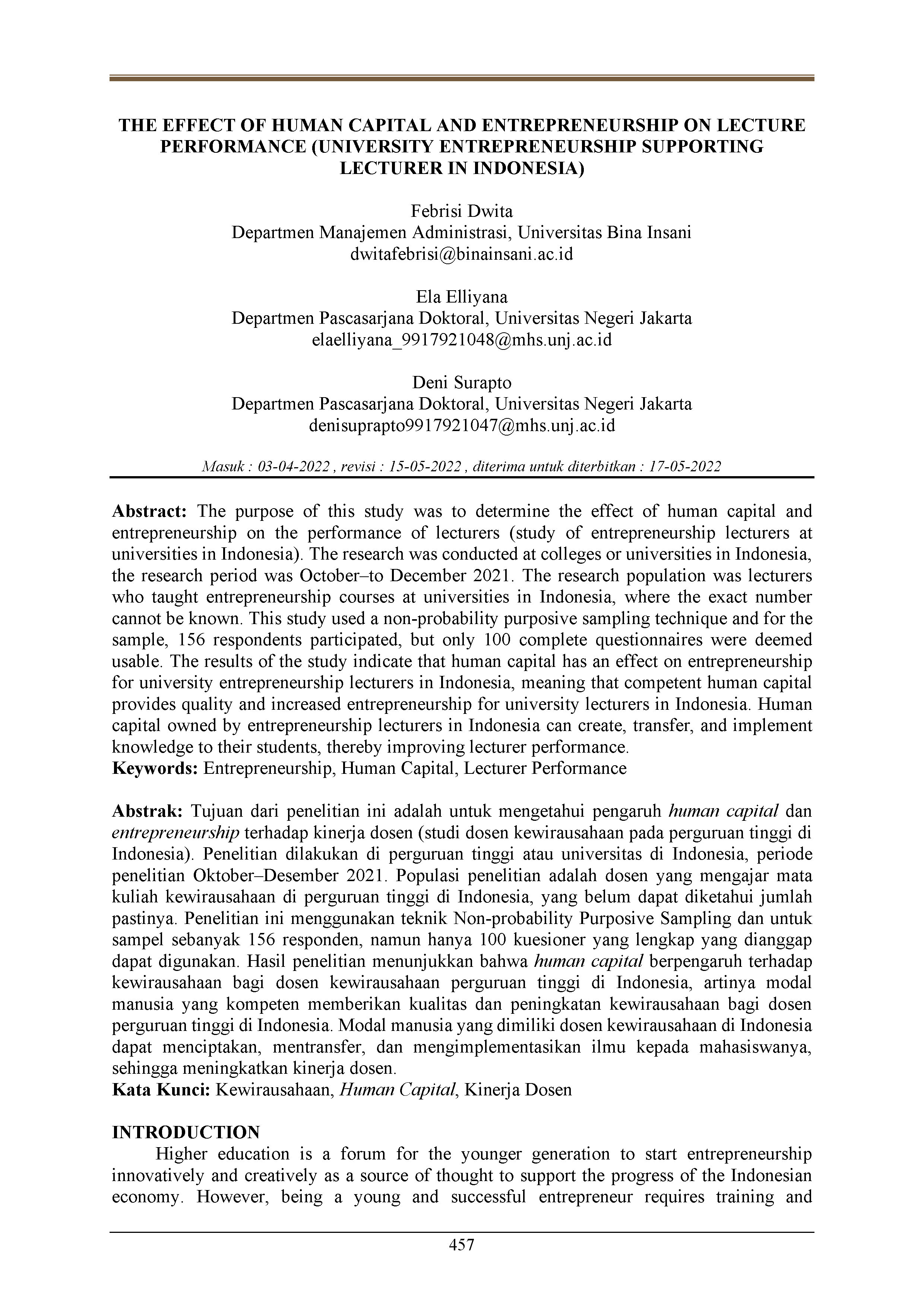The Effect of Human Capital and Entrepreneurship on Lecture Performance (University Entrepreneurship Supporting Lecturer in Indonesia)
Main Article Content
Abstract
The purpose of this study was to determine the effect of human capital and entrepreneurship on the performance of lecturers (study of entrepreneurship lecturers at universities in Indonesia). The research was conducted at colleges or universities in Indonesia, the research period was October–to December 2021. The research population was lecturers who taught entrepreneurship courses at universities in Indonesia, where the exact number cannot be known. This study used a non-probability purposive sampling technique and for the sample, 156 respondents participated, but only 100 complete questionnaires were deemed usable. The results of the study indicate that human capital has an effect on entrepreneurship for university entrepreneurship lecturers in Indonesia, meaning that competent human capital provides quality and increased entrepreneurship for university lecturers in Indonesia. Human capital owned by entrepreneurship lecturers in Indonesia can create, transfer, and implement knowledge to their students, thereby improving lecturer performance.
Tujuan dari penelitian ini adalah untuk mengetahui pengaruh human capital dan entrepreneurship terhadap kinerja dosen (studi dosen kewirausahaan pada perguruan tinggi di Indonesia). Penelitian dilakukan di perguruan tinggi atau universitas di Indonesia, periode penelitian Oktober–Desember 2021. Populasi penelitian adalah dosen yang mengajar mata kuliah kewirausahaan di perguruan tinggi di Indonesia, yang belum dapat diketahui jumlah pastinya. Penelitian ini menggunakan teknik Non-probability Purposive Sampling dan untuk sampel sebanyak 156 responden, namun hanya 100 kuesioner yang lengkap yang dianggap dapat digunakan. Hasil penelitian menunjukkan bahwa human capital berpengaruh terhadap kewirausahaan bagi dosen kewirausahaan perguruan tinggi di Indonesia, artinya modal manusia yang kompeten memberikan kualitas dan peningkatan kewirausahaan bagi dosen perguruan tinggi di Indonesia. Modal manusia yang dimiliki dosen kewirausahaan di Indonesia dapat menciptakan, mentransfer, dan mengimplementasikan ilmu kepada mahasiswanya, sehingga meningkatkan kinerja dosen.
Article Details

This work is licensed under a Creative Commons Attribution-NonCommercial-ShareAlike 4.0 International License.
This work is licensed under a Jurnal Manajemen Bisnis dan Kewirausahaan Creative Commons Attribution-ShareAlike 4.0 International License.
References
Butler-Henderson, K., Crawford, J., Rudolph, J., Lalani, K., & M., S. K. (2020). COVID-19 in Higher Education Literature Database (CHELD V1): An open access systematic literature review database with coding rules. Journal of Applied Learning & Teaching, 3(2), 11–16. https://doi.org/10.37074/jalt.2020.3.2.11
Ellett, C. D., & Teddlie, C. (2003). Teacher evaluation, teacher effectiveness and school effectiveness: Perspectives from the USA. Journal of Personnel Evaluation in Education, 17(1), 101–128. http://link.springer.com/10.1023/A:1025083214622
Farinloye, T., Wayne, T., Mogaji, E., & Kuika Watat, J. (2020). Social media for universities’ strategic communication. In Strategic Marketing of Higher Education in Africa (pp. 96–115). Routledge. https://doi.org/10.4324/9780429320934-8
Hair, J. F., Hult, G. T. M., Ringle, C. M., Sarstedt, M., & Thiele, K. O. (2017). Mirror, mirror on the wall: a comparative evaluation of composite-based structural equation modeling methods. Journal of the Academy of Marketing Science, 45(5), 616–632. https://doi.org/10.1007/s11747-017-0517-x
Helgesen, Ø., & Nesset, E. (2007). Images, satisfaction and antecedents: Drivers of student loyalty? A case study of a Norwegian University College. Corporate Reputation Review, 10(1), 38–59. https://doi.org/10.1057/palgrave.crr.1550037
Kato, M., Okamuro, H., & Honjo, Y. (2015). Does founders’ human capital matter for innovation? Evidence from Japanese start-ups. Journal of Small Business Management, 53(1), 114–128. https://doi.org/10.1111/jsbm.12094
Lee, B. (2019). Human capital and labor: The effect of entrepreneur characteristics on venture success. International Journal of Entrepreneurial Behaviour and Research, 25(1), 29–49. https://doi.org/10.1108/IJEBR-10-2017-0384
Magno, C., & Sembrano, J. (2008). The role of teacher efficacy and characteristics on teaching effectiveness, performance, and use of leaner-centered practices. The Asia-Pacific Education Researcher, 16(1), 73–90. https://doi.org/10.3860/taper.v16i1.93
Mozaffari, Z. (2021). The effect of human capital on economic growth in Iran; GMM in time series approach and fuzzy logic. Journal of Economic Research, 56(1), 145–172. https://doi.org/10.22059/JTE.2021.324398.1008473
Namini, M. T., & Irajirad, A. (2019). The impact of communication and human capital on performance of Agricultural Jahad Higher Education Centers from the lecturers’ viewpoint. Journal of Agricultural Education Administration Research, 11(48), 75–87. https://itvhe.areeo.ac.ir/article_119649_c061cc3f98cfe7403f03f63de038d5ac.pdf
Rabia, A. B., & Elliyana, E. (2019). Human capital and economic growth in Indonesia. Journal of Contemporary Economic Studies, 4(1), 169–176. https://papers.ssrn.com/sol3/Delivery.cfm/SSRN_ID3767925_code4411443.pdf?abstractid=3767925&mirid=1&type=2
Ringle, C. M., Sarstedt, M., Mitchell, R., & Gudergan, S. P. (2020). Partial least squares structural equation modeling in HRM research. International Journal of Human Resource Management, 31(12), 1617–1643. https://doi.org/10.1080/09585192.2017.1416655
Sok-Foon, Y., Sze-Yin, J. H., & Yin-Fah, B. C. (2012). Student evaluation of lecturer performance among private university students. Canadian Social Science, 8(84), 238–243. https://doi.org/10.3968/j.css.1923669720120804.3022
Youssef, A. Ben, Boubaker, S., & Omri, A. (2018). Entrepreneurship and sustainability: The need for innovative and institutional solutions. Technological Forecasting and Social Change, 129, 232–241. https://doi.org/10.1016/j.techfore.2017.11.003


